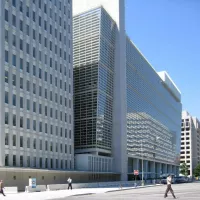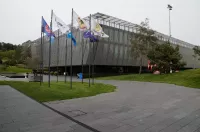Costa Rica is a Central American country bordering Nicaragua to the north and Panama to the southeast. It has coastlines on both the Caribbean Sea and the Pacific Ocean. The country covers approximately 51,180 square kilometers and has a population of around five million people. San José is its capital and largest city, housing an estimated 352,381 residents, with the surrounding metropolitan area holding around two million people.
1917: Military Dictatorship Begins
In 1917, General Federico Tinoco Granados began ruling as a military dictator.
1919: Overthrow of Military Dictator
In 1919, General Federico Tinoco Granados was overthrown and forced into exile.
1927: 1927 Census
In 2022, ethnic or racial identity for all groups was recorded in the census separately for the first time since the 1927 census.
1936: Costa Rica Enters Summer Olympics
Costa Rica first participated in the Summer Olympics in 1936.
1938: Collective Agreement with Workers
In 1938, the United Fruit Company was required to sign a collective agreement with its workers after The Great Banana Strike.
1940: Healthcare Provision by Government and Charities
Before 1940, healthcare in Costa Rica was mainly provided by government hospitals and charities.
1940: Rafael Ángel Calderón Guardia Presidency Begins
In 1940, Rafael Ángel Calderón Guardia began his term as president.
1941: Creation of the Social Insurance Administration
In 1941, the Social Insurance Administration (Caja Costarricense de Seguro Social – CCSS) was created, initiating universal health care for wage-earning residents.
1944: End of Rafael Ángel Calderón Guardia Presidency
In 1944, Rafael Ángel Calderón Guardia's presidency ended.
December 1948: Costa Rica Abolishes Military Force
On 1 December 1948, Costa Rica officially abolished its military force, redirecting funds to healthcare and education.
1948: Armed Uprising Led by José Figueres Ferrer
In 1948, José Figueres Ferrer led an armed uprising following a disputed presidential election.
1948: Uninterrupted Democracy Begins
Since 1948, Costa Rica has had uninterrupted democracy.
November 1949: Transfer of Power to Ulate
On 8 November 1949, the government junta transferred power to Ulate.
1949: Catholicism as State Religion in Constitution
According to the 1949 Constitution, Catholicism is the official state religion of Costa Rica, which also guarantees freedom of religion.
1949: Abolishment of the Army
In 1949, Costa Rica permanently abolished its army.
1949: Abolition of Military in Constitution
In 1949, the abolition of the military was formally introduced in Article 12 of the Costa Rican Constitution.
1949: Abolition of Army and Education Focus
In 1949, when Costa Rica abolished its army, there was a shift to prioritize education, with the "army being replaced with an army of teachers".
1953: Figueres Wins Democratic Election
In 1953, José Figueres Ferrer won the country's first democratic election under the new constitution.
1968: World Constituent Assembly Convened
In 1968, Costa Rica became a signatory to the agreement to convene a convention for drafting a world constitution, resulting in the first World Constituent Assembly to draft the Constitution for the Federation of Earth.
1972: High Perinatal Mortality Rate
In 1972, the perinatal mortality rate was 12.0 per 1000.
1973: CCSS Assumes Control of Health Care
In 1973, the CCSS took over administration of all 29 public hospitals and all healthcare services, launching a Rural Health Program for primary care.
1993: Laws Passed for Elected Health Boards
In 1993, laws were passed to establish elected health boards representing health consumers, social insurance representatives, employers, and social organizations.
1996: Enactment of Forest Law
In 1996, the Forest Law was enacted to provide direct financial incentives to landowners for environmental services.
1999: Tourism Exceeds Cash Crops
Since 1999, tourism has generated more foreign exchange than the combined exports of bananas, pineapples, and coffee.
2000: Social Health Insurance Coverage
By 2000, social health insurance coverage was available to 82% of the Costa Rican population.
2000: Low Malaria Incidence
In 2000, Costa Rica recorded a very low malaria incidence of 48 per 100,000.
2001: Decreased Perinatal Mortality Rate
In 2001, the perinatal mortality rate dropped to 5.4 per 1000.
2002: Health Statistics and Preventive Care Successes
In 2002, Costa Rica saw 0.58 new general practitioner consultations and 0.33 new specialist consultations per capita, with a hospital admission rate of 8.1%. Preventive care was effective, with 96% of women using contraception and 87% of pregnant women receiving antenatal care. There were no reported cases of measles in 2002.
2002: CONCACAF Gold Cup Runner-Up
In 2002, Costa Rica's national football team was the runner-up in the regional CONCACAF Gold Cup.
2004: Tourism Revenue Exceeds Cash Crops
By 2004, tourism was generating more revenue and foreign exchange than bananas and coffee combined.
2006: Costa Rica as a Medical Tourism Destination
In 2006, Costa Rica welcomed 150,000 foreigners for medical treatment, owing to its geographic proximity to America, high-quality medical services, and lower costs.
2006: Coffee as Third Cash Crop
In 2006, coffee was the third cash crop export for Costa Rica.
May 2007: Carbon Neutrality Goal
In May 2007, the Costa Rican government announced its intentions to become 100% carbon neutral by 2021.
2008: Healthcare Facilities in Costa Rica
In 2008, Costa Rica had five specialty national hospitals, three general national hospitals, seven regional hospitals, 13 peripheral hospitals, and 10 major clinics serving as referral centers for primary care clinics.
2008: Squirrel Monkey Status Upgrade
In 2008, the Central American squirrel monkey's status was upgraded from endangered to vulnerable.
March 2009: Costa Rica re-establishes relations with Cuba
On 18 March 2009, President Óscar Arias Sánchez re-established normal diplomatic relations with Cuba after a 47-year freeze, stating the importance of bridging divides with geographically and culturally close nations.
July 2009: International Court of Justice upholds Costa Rica's navigation rights
On 14 July 2009, the International Court of Justice in the Hague upheld Costa Rica's navigation rights on the San Juan River for commercial purposes and subsistence fishing.
December 2009: Costa Rica's Term on UN Security Council Expires
On 31 December 2009, Costa Rica's term on the United Nations Security Council expired, marking the end of their nonrenewable, two-year term.
2009: Happy Planet Index Ranking
In 2009, the New Economics Foundation (NEF) ranked Costa Rica first in its Happy Planet Index, which measures health and happiness per unit of environmental input.
2010: Life Expectancy in Costa Rica
According to the UNDP, in 2010, the life expectancy at birth for Costa Ricans was 79.3 years.
2010: Immigrant Population in 2010
According to the World Bank, in 2010, approximately 489,200 immigrants resided in Costa Rica, primarily from Nicaragua, Panama, and other Central American countries.
2010: Dispute around Isla Calero
In 2010, a dispute arose concerning Isla Calero and the effects of Nicaraguan dredging of the San Juan River in that area.
March 2011: Inauguration of New Football Stadium
In March 2011, a new state-of-the-art football stadium, built by the PRC in Parque la Sabana, was inaugurated with a match between the national teams of Costa Rica and China.
2011: Native American Population in 2011
In 2011, Costa Rica had over 104,000 Native American or indigenous inhabitants, representing 2.4% of the population, residing mostly in secluded reservations across eight ethnic groups.
2011: 2011 Population Data
In 2011, the census reported 83.6% of the population as whites or mestizos, 6.7% mulattoes, 2.4% Native American, 1.1% black or Afro-Caribbean, 1.1% Other, 2.9% None, and 2.2% unspecified.
2011: Travel and Tourism Competitiveness Index Ranking
In the 2011 Travel and Tourism Competitiveness Index, Costa Rica ranked 44th in the world.
2011: 2011 Census Results
The 2011 census in Costa Rica classified 83.6% of the population as white or Mestizo, 6.7% as Mulatto, and 2.4% as Indigenous, indicating a smaller mixed-blood population compared to other Latin American countries.
2012: Happy Planet Index Ranking
In 2012, Costa Rica was once again ranked first in the Happy Planet Index by the New Economics Foundation (NEF).
2012: Rise in Asylum Seekers
The number of asylum seekers rose fivefold from 2012 to 2015, reaching more than 110,000 in 2015.
2014: World Cup Quarter-Finals
In 2014, the Costa Rican national football team reached the quarter-finals of the FIFA World Cup for the first time.
2015: Renewable Energy Usage
By 2015, 93 percent of Costa Rica's electricity came from renewable sources.
2015: Trade Deficit
In 2015, Costa Rica had a trade deficit of US$2.39 billion.
2015: Free Trade Zone Job Support
In 2015, the Free Trade Zones in Costa Rica supported over 82 thousand direct jobs and 43 thousand indirect jobs.
2015: Tourism Sector Contribution to GDP
In 2015, the tourism sector was responsible for 5.8% of Costa Rica's GDP, totaling $3.4 billion.
2015: Coffee Export Value
In 2015, the value of coffee exports was US$305.9 million.
2015: Immigration and Asylum Seekers in 2015
In 2015, there were about 420,000 immigrants in Costa Rica, with asylum seekers, mainly from Honduras, El Salvador, Guatemala, and Nicaragua, rising to over 110,000.
2016: U.S. Government Report on Education Challenges
A 2016 U.S. government report identified challenges in Costa Rica's education system, including high dropout rates and the need for more multilingual workers and STEM graduates.
2016: Amazon.com Employment
In 2016, Amazon.com had approximately 3,500 employees in Costa Rica.
2016: Budget Allocation for Education
In 2016, Costa Rica allocated approximately 6.9% of its budget to education.
2016: Foreign Visitors Increase
In 2016, Costa Rica had 2.9 million foreign visitors, a 10% increase from 2015.
2016: Costa Rica as a Magnet for Migrants
In 2016, Costa Rica was described as a "magnet" for migrants from South and Central America and other countries aiming to reach the United States.
2016: Coffee Production Decline
In 2016, coffee production declined by 17.5%.
2016: Tourism Contribution to GDP and Jobs
In 2016, the World Travel & Tourism Council estimated that tourism directly contributed 5.1% to Costa Rica's GDP and supported 110,000 direct jobs.
November 2017: Costa Rica Named Happiest Country
In November 2017, National Geographic magazine recognized Costa Rica as the happiest country in the world.
2017: Travel and Tourism Competitiveness Index Ranking
By the time of the 2017 report, Costa Rica reached 38th place in the Travel and Tourism Competitiveness Index.
2017: Amazon.com Expansion Plans
In 2017, Amazon.com planned to increase its workforce in Costa Rica by 1,500 employees.
2017: Costa Rica Signs UN Treaty on Nuclear Weapons Prohibition
In 2017, Costa Rica became a signatory to the UN treaty on the Prohibition of Nuclear Weapons.
2017: Happy Planet Index Ranking
In 2017, Costa Rica ranked 12th on the Happy Planet Index in the World Happiness Report by the UN and was considered the happiest country in Latin America.
2017: Elayne Whyte Gómez at UN Office at Geneva
In 2017, Elayne Whyte Gómez became the Permanent Representative of Costa Rica to the UN Office at Geneva and President of the United Nations Conference to Negotiate a Legally Binding Instrument to Prohibit Nuclear Weapons.
2017: Latinobarómetro Survey Results
The 2017 Latinobarómetro survey indicated that 57% of Costa Ricans identify as Roman Catholic, 25% as Evangelical Protestant, 15% report no religion, and 2% belong to another religion.
2018: NORCECA Beach Volleyball Continental Cup
From 2018 to 2020, Costa Rica featured a women's national team in beach volleyball that competed at the NORCECA Beach Volleyball Continental Cup.
2018: Forest Landscape Integrity Index
In 2018, Costa Rica had a Forest Landscape Integrity Index mean score of 4.65/10, ranking it 118th globally.
2018: Gold Production
In 2018, Costa Rica produced 5.2 tons of gold.
2018: University of Costa Rica Survey on Religious Affiliation
In 2018, a University of Costa Rica survey showed 52% of Costa Ricans as Catholics, 22% as Protestants, 17% as irreligious, and 3% identifying with other religions.
2019: Renewable Energy Production
In 2019, Costa Rica produced 99.62% of its electricity from renewable sources.
November 2020: FIFA U-20 Women's World Cup Postponement and Relocation Announcement
On 17 November 2020, FIFA announced that the 2020 FIFA U-20 Women's World Cup, originally granted to Costa Rica and Panama, would be held in Costa Rica in 2022 due to the COVID-19 pandemic after being postponed until 2021.
2020: NORCECA Beach Volleyball Continental Cup
From 2018 to 2020, Costa Rica featured a women's national team in beach volleyball that competed at the NORCECA Beach Volleyball Continental Cup.
2020: High Immunization Coverage
In 2020, Costa Rica maintained an immunization coverage rate above 95% for all antigens among children under one year old.
2021: Top Team in Central America's AFECAVOL Zone
As of late 2021, Costa Rica's women's national volleyball team was the top team in Central America's AFECAVOL zone.
2021: Target for Carbon Neutrality
By 2021, the Costa Rican government intended to become 100% carbon neutral.
2021: Postponement of FIFA U-20 Women's World Cup
Due to the COVID-19 pandemic, the 2020 FIFA U-20 Women's World Cup was postponed until 2021.
2021: Democracy Ranking
In 2021, Costa Rica was ranked the 35th most democratic country according to the Freedom in the World index.
2021: Costa Rica Launches Beyond Oil and Gas Alliance
In 2021, Costa Rica, along with Denmark, launched the "Beyond Oil and Gas Alliance" (BOGA) at the COP26 Climate Summit to promote the cessation of fossil fuel use.
2022: Latest Presidential Elections
In 2022, Costa Rica held its latest presidential elections.
2022: Hosting the FIFA U-20 Women's World Cup
In 2022, Costa Rica hosted the FIFA U-20 Women's World Cup.
2022: Human Development Index Ranking
In 2022, Costa Rica was ranked 58th in the world on the Human Development Index (HDI).
2022: 2022 Census Results
In 2022, the Costa Rican census counted a total population of 5,044,197 people and recorded ethnic or racial identity for all groups separately for the first time since the 1927 census.
2023: World Happiness Report Ranking
In 2023, Costa Rica was ranked the 23rd happiest country in the World Happiness Report.
2023: Renewable Energy Usage
In 2023, approximately 95% of Costa Rica's electricity was generated from renewable sources.
December 2024: Unemployment and Poverty Rates
In December 2024, Costa Rica's unemployment rate dropped to 6.9% and the national poverty rate fell to 10.0%.
2024: Costa Rica's Peace Ranking in 2024
According to the 2024 Global Peace Index, Costa Rica is ranked as the 58th most peaceful country in the world.
2024: Electricity Rationing
In 2024, Costa Rica faced electricity rationing due to drought conditions.
2024: Press Freedom Index Ranking
In 2024, Costa Rica was ranked 26th freest press according to the Press Freedom Index.
2024: Global Innovation Index Ranking
In 2024, Costa Rica was ranked 70th in the Global Innovation Index.
2024: Nominal GDP Per Capita
In 2024, Costa Rica's nominal GDP per capita was estimated at US$17,501.
2024: Costa Rica in the Global Hunger Index
In the 2024 Global Hunger Index, Costa Rica is one of 22 countries with a GHI score of less than 5.
2050: Goal of Net-Zero Carbon Emissions
By 2050, Costa Rica aims to achieve net-zero carbon emissions.
Mentioned in this timeline
China officially the People's Republic of China PRC is an...

The World Bank is an international financial institution offering loans...

Football is a family of team sports primarily involving kicking...

Malaria is a mosquito-borne infectious disease transmitted by Anopheles mosquitoes...

Measles also known as morbilli or rubeola is a highly...

FIFA F d ration Internationale de Football Association is the...
Trending

4 months ago Casper Ruud Becomes Global Ambassador for Mango Man: A Fashionable Partnership

10 months ago Camila Osorio to face Higuita Barraza in Copa Colsanitas; Predictions and Odds

6 months ago Iga Swiatek dominates Potapova in Cincinnati Open, securing a swift victory in 73 minutes

3 months ago Jannik Sinner Dominates, Reaches Paris Masters Final, Eyes No. 1 Ranking Return

3 months ago ATP Almaty Open: Medvedev vs Walton Predictions and Betting Odds, Darderi Mentioned

4 months ago Addison Rae on the Tonight Show: Interview and performance highlight rising star.
Popular

Thomas Douglas Homan is an American law enforcement officer who...

Martin Luther King Jr was a pivotal leader in the...

XXXTentacion born Jahseh Dwayne Ricardo Onfroy was a controversial yet...

William Franklin Graham III commonly known as Franklin Graham is...

Instagram is a photo and video-sharing social networking service owned...

Jupiter is the fifth and largest planet from the Sun...